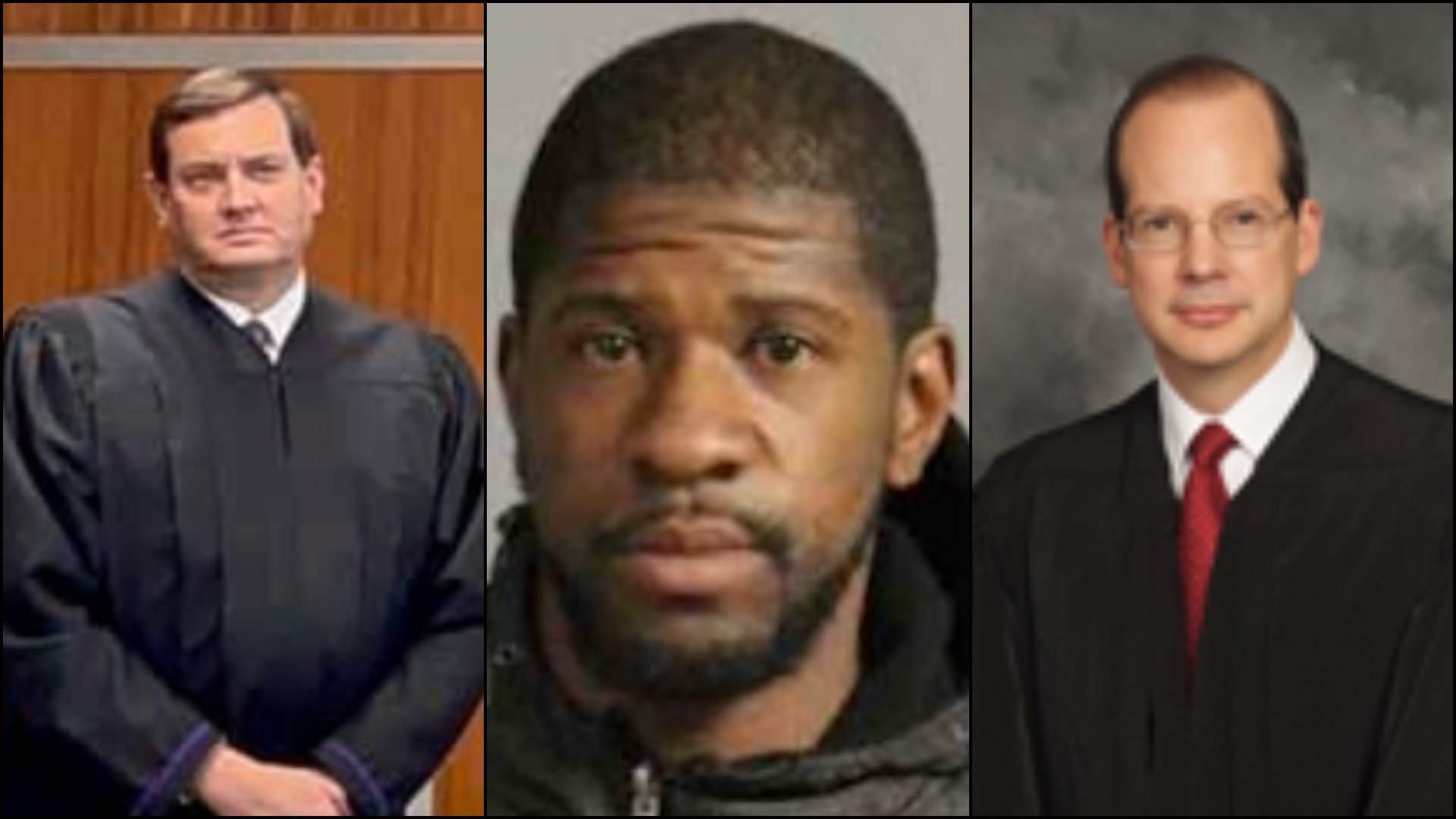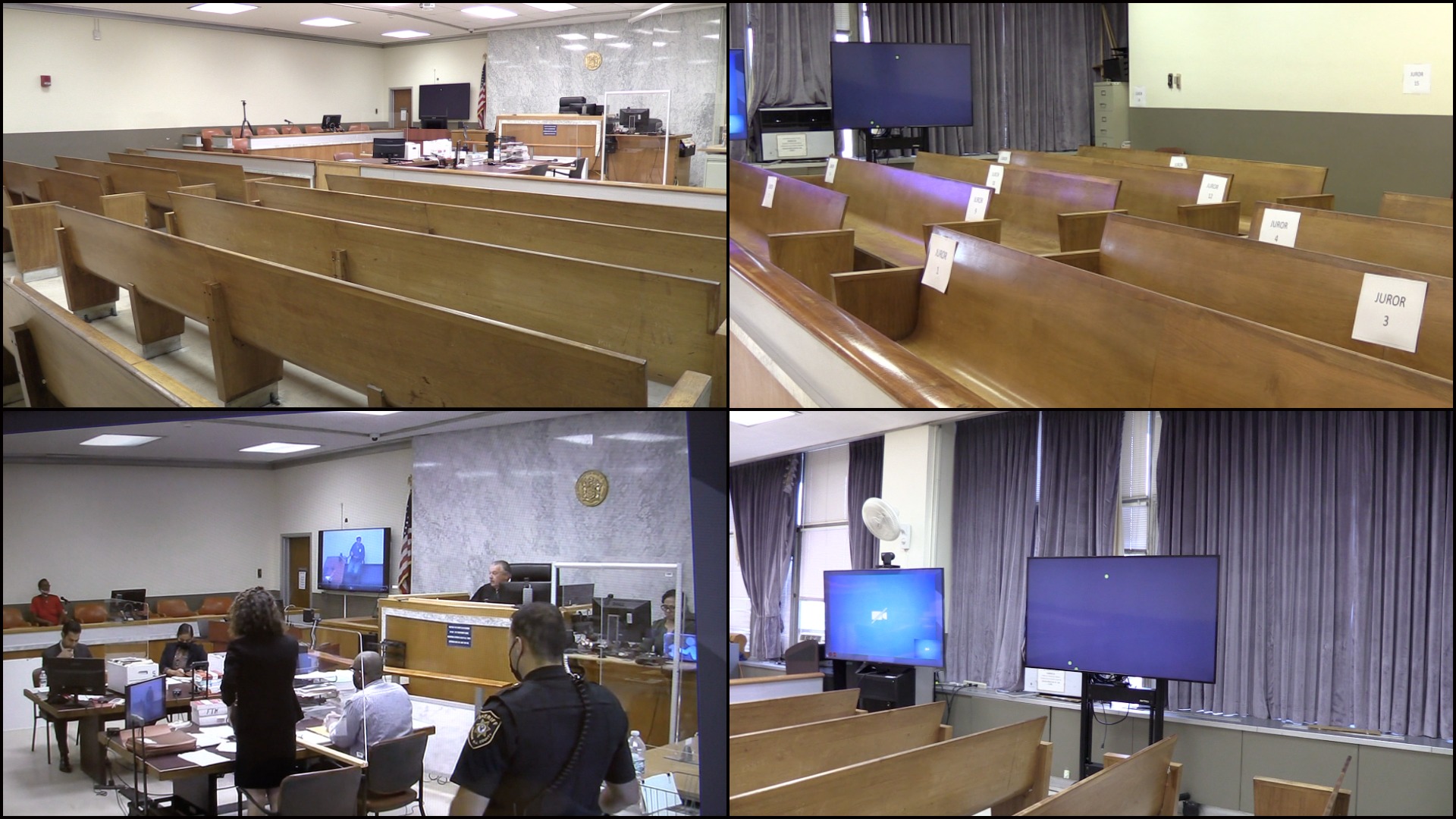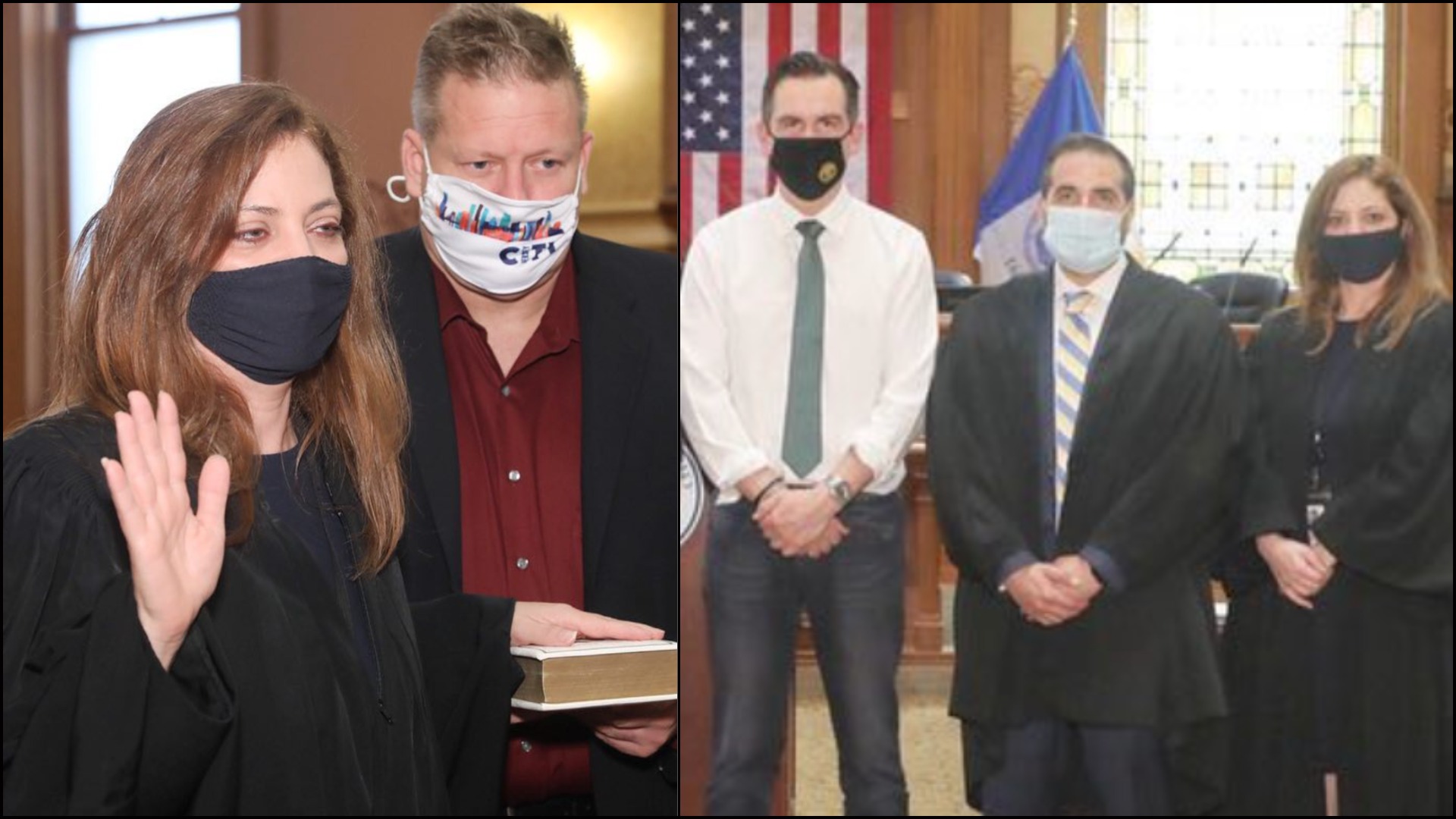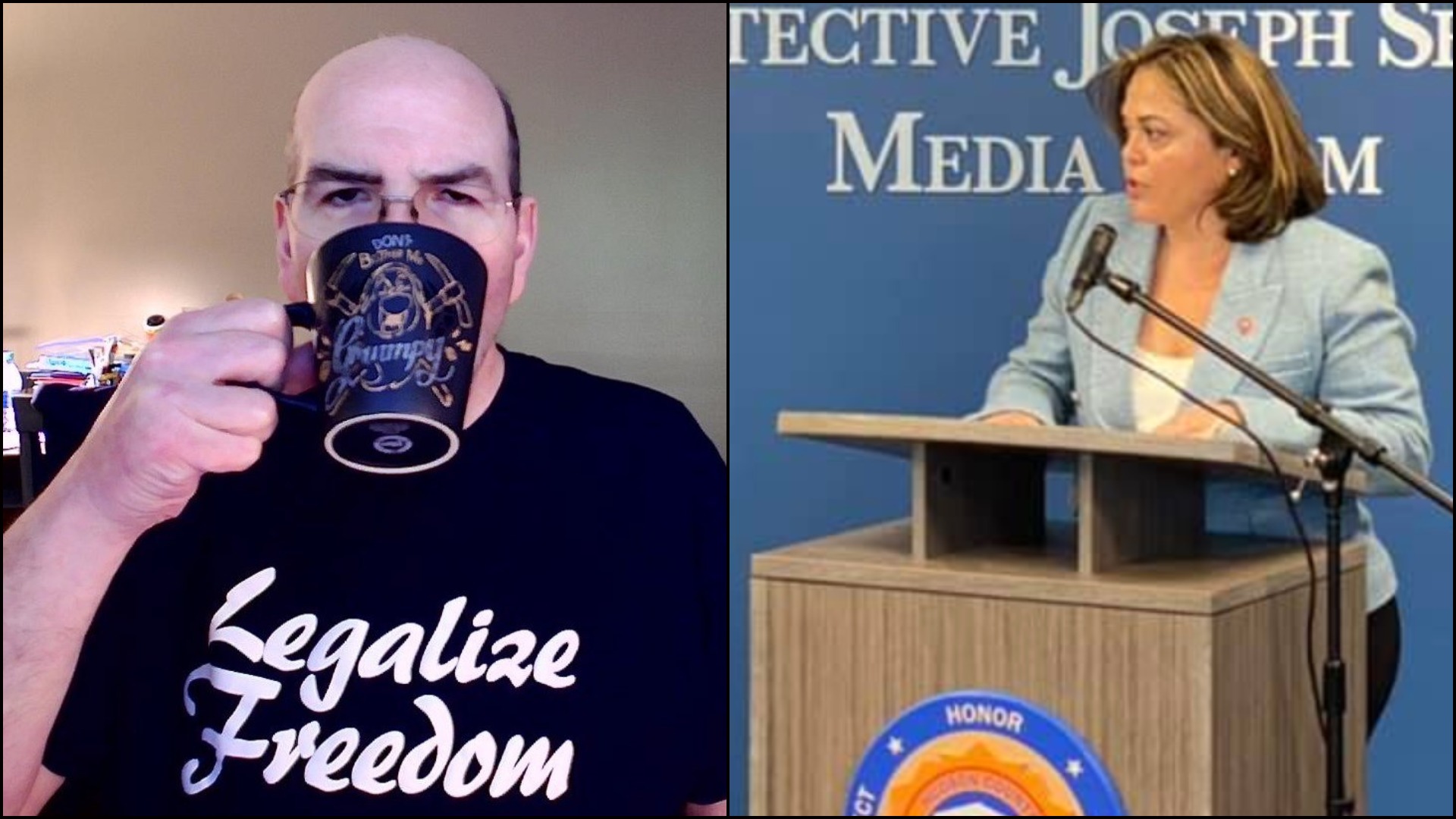Judge Jeffrey R. Jablonski wouldn’t allow filming of Rashawn Simmons’ trial for the attempted murder of a Jersey City police officer.

Judge Jeffrey R. Jablonski, Rashawn Simmons, and Chief Justice Stuart Rabner.
In a landmark New Jersey Supreme Court decision, North Jersey Media Group v. Twp. of Lyndhurst, Chief Justice Stuart Rabner wrote that “in the case of a police shooting, non-disclosure of dash-cam videos can undermine confidence in law enforcement” and “fuel the perception that information is being concealed.”
Using similar logic, blocking video cameras from criminal trials can undermine confidence in the courts. Hudson County Assignment Judge Jeffrey R. Jablonski denying Real Garden State’s request to film the trial of Rashawn Simmons, accused of attempted murder of a police officer, could easily fuel the perception that information is being concealed.
It was a strange turn of events because I was filming a separate murder trial, State v. Joseph Summers, in Hudson County Superior Court for two weeks prior to Jablonski’s decision. Due to COVID protocols, I recorded witness testimony on a TV displaying CCTV video; however, I was allowed to film inside the courtroom for closing arguments, jury questions, and Judge John A. Young’s declaration of a mistrial.

COVID-safe trial in Judge John A. Young’s courtroom; jury box is the witness stand, the gallery is the jury box.
To the best of my knowledge, there were no complaints about my presence in the courtroom. Also, it wasn’t the first time I’ve filmed criminal proceedings in Hudson County.
When asked if Jablonski could provide a reason for his decision to block filming of the Simmons’ trial, the assignment judge’s secretary referred me to the denial – which states “Still photography from the technology room is permitted. Transcripts of the proceedings can be requested.”
Furthermore, as the trial’s first witness was testifying for the state, during the afternoon of October 13, 2021, livestream video from the courtroom stopped working on NJ E-Courts. Various legal sources claim Jablonski ordered the cameras turned off. A spokesperson for the judiciary, Peter McAleer, stated there were “technical issues with the livestream” on the New Jersey Courts website.
Additionally, McAleer stated that “access for the public to view the trial was made available through a livestream to another room in the courthouse.” The spokesperson wouldn’t directly answer whether Jablonski would ban filming moving forward, but said “judges will continue to entertain requests to film in courtrooms on a case-by-case basis.”
What’s interesting about the Simmons’ case, from the few minutes of trial I observed, is that the body-cam footage played in court didn’t seem particularly damning for the defendant. It supposedly took the jury about thirty minutes to find the defendant not guilty of all charges.
Simmons’ attorney, James Lisa, said JCPD P.O. David Wiggan, the alleged victim, was an “honest and credible officer” that never testified to seeing the defendant with a gun (only a black object in the suspect’s hand). Lisa credited Morrease Leftwich, his law clerk, with helping to secure the defendant’s victory.
As news of the verdict spread amongst law enforcement officers, multiple sources reached out to Real Garden State expressing dismay & outrage. Unfortunately, no trial footage makes it difficult to validate or dispel the notion an injustice has occurred.
Of note, the trial was held in Judge Patrick J. Arre’s courtroom and the first witness, Wiggan, appeared to be testifying on the witness stand. That means it may have been possible to place a camera in the traditional jury box and maintain social distancing while jurors were seated in the gallery.
As for Simmons, if not for this piece, there wouldn’t be any public knowledge of his acquittal. Due to the death of local journalism, the only time people read about the criminal courts is when prosecutors issue a press release.
For example, besides some court staff, lawyers, and people following Real Garden State on Instagram, no one knows Summers’ trial ended with a hung jury. If he were found guilty, numerous media outlets would cite a press release from the Hudson County Prosecutor’s Office (HCPO) announcing the verdict.
Although I haven’t finished my story about the Summers case, the performances of HCPO Asst. Prosecutor Edward Bilinkas and Hudson County Asst. Deputy Public Defender Claude Heffron were a boon to their respective offices. As previously mentioned, it’s a shame I wasn’t able to film the whole trial in the courtroom, but at least I was able to capture closing arguments and jury questions.
Because of that access, key pieces of evidence were captured for the public to view (witness statements, CCTV, phone records, etc.). When the Summers story is complete, like other cases before, people will see the evidence presented to jurors and reach their own conclusions.
In the year 2021, despite how divisive politics have become, people from across the political spectrum can agree that criminal trials aren’t truly public if they can’t be filmed and digitally transmitted (with basic guidelines, of course). In fact, the U.S. Senate Judiciary Committee recently approved bipartisan legislation which would expand the use of cameras in federal courts.
“Our judicial system is one of the crown jewels of American democracy, but as technology evolves, so should transparency,” Sen. John Cornyn (R-TX) said. “Texas has led the way with permitting cameras in many of the Lone Star State’s courtrooms, and I’m proud to introduce this legislation to ensure federal courts are able to provide that same access to the public.”
Whether or not Texas is leading the way when it comes to courtroom transparency, let’s hope New Jersey isn’t moving in the opposite direction. As Sen. Richard Blumenthal (D-CT) stated in support of cameras in courtrooms, “Judicial proceedings can be a matter of life or death – and any process with that kind of impact on people’s lives shouldn’t be cloaked in secrecy.”


